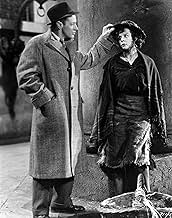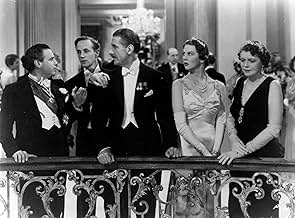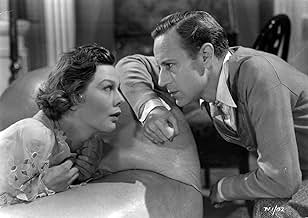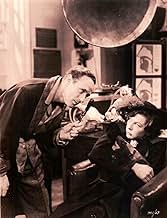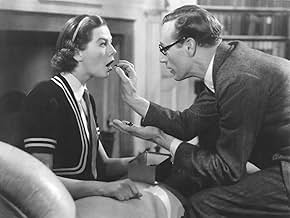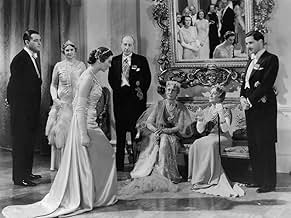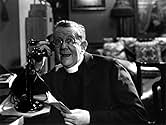IMDb RATING
7.7/10
9.8K
YOUR RATING
A phonetics and diction expert makes a bet that he can teach a cockney flower girl to speak proper English and pass as a lady in high society.A phonetics and diction expert makes a bet that he can teach a cockney flower girl to speak proper English and pass as a lady in high society.A phonetics and diction expert makes a bet that he can teach a cockney flower girl to speak proper English and pass as a lady in high society.
- Won 1 Oscar
- 3 wins & 5 nominations total
Leueen MacGrath
- Clara Eynsford Hill
- (as Leueen Macgrath)
Irene Browne
- Duchess
- (as Irene Brown)
Cathleen Nesbitt
- A Lady
- (as Kathleen Nesbitt)
Storyline
Did you know
- TriviaThe scene in which Eliza accidentally swallows a marble while having an elocution lesson does not appear in the original play. During rehearsals for this scene, a pained expression came over Wendy Hiller's face. When she spat out the marbles she had in her mouth, she said, "Leslie, I've swallowed one!" to which Leslie Howard replied, "Never mind, there are plenty more." This caused such amusement among the watching crew that it was added to the movie and to its musical version, My Fair Lady (1964).
- GoofsAfter the ball when Mrs. Pearce serves Professor Higgins his tea, the shadow of the camera can be seen in the bottom left, moving back across his blanket.
- Quotes
Eliza Doolittle: Walk? Not bloody likely. I'm going in a taxi.
- Crazy creditsOpening credits prologue: PYGMALION WAS A MYTHOLOGICAL CHARACTER WHO DABBLED IN SCULPTURE. HE MADE A STATUE OF HIS IDEAL WOMAN-GALATEA. IT WAS SO BEAUTIFUL THAT HE PRAYED THE GODS TO GIVE IT LIFE. HIS WISH WAS GRANTED.
BERNARD SHAW IN HIS FAMOUS PLAY GIVES A MODERN INTERPRETATION OF THIS THEME.
- Alternate versionsThis film was made a year before the Hays Office gave Clark Gable permission to say "Frankly, my dear, I don't give a damn", so while in the British prints of this film Leslie Howard often utters the word, in the American prints the word "damn" is replaced by either "hang" or "confounded".
- ConnectionsFeatured in Metro-Goldwyn-Mayer's Big Parade of Hits for 1940 (1940)
Featured review
Shaw's One Academy Award
George Bernard Shaw was very wary about allowing his movies to be filmed. He had seen movies by other famous writers and dramatists thoroughly rewritten for the screen, and thoroughly wrecked as a result. So the greatest English speaking dramatist of the 20th Century held off from any involvement with motion pictures into the 1930s. Then he met Gabriel Pascal. Mr. Pascal was thoroughly honest. He admitted he did not have a cent to his name, but he also admitted a desire to produce all of Shaw's major plays as movies exactly as Shaw wanted them shown. Shaw was impressed and made an agreement giving Pascal a monopoly on all his plays for movie making. In return, Shaw was to be involved in the productions.
It turned out to be a remarkably small but fruitful partnership. Of the over fifty plays of Shaw's output (not to mention several novels), only four were produced by Pascal. They are PYGMALION (1938), MAJOR BARBARA (1940), CAESAR AND CLEOPATRA (1945), and ANDROCLES AND THE LION (1952). They are all good films, and the first three have reason to be considered great. Shaw died in 1950, so he was not there to see (after Pascal's death) the decline in standards of films based on his plays - such as Otto Preminger's brave attempt at ST. JOAN, and the wretched THE MILLIONAIRESS with Peter Sellers and Sophia Loren.
PYGMALION was a good choice for the first of the series, probably as it was the most popular comedy by Shaw. It was also one of the most controversial plays because of the problem that bedeviled the original production of 1914 and has effected it ever since: how is it supposed to end? Will Higgins and Eliza put aside their differences and admit they love each other and come together at the end?
Shaw clearly felt that Pygmalion Higgins and Galatea Doolittle were doomed not to end in an embrace. He wanted the audience to be left thinking of Eliza as one of the 20th Century's "New Women", who is independent and strong, not just a piece of weak clay to be kneaded by an artistic and overpowering male ego. In the dialog (which he uses in the play and in the movie script) Shaw insisted that Eliza favors Freddy Eynesford-Hill over Higgins because Freddy is a weakling. All her life she has been dominated by strong men (first her father Alfred, then Higgins, and (although he is kinder) Col. Pickering). Freddy is the first one to show his need for guidance and help - he is shown at the beginning of the play as little better than a servant for his mother and sister, getting them a cab in the rain.
But Shaw did not have an easy time with this view. The play was produced by Sir Herbert Beerbohm Tree, one of England's leading stars of the Edwardian and Georgian stage (he was brother of critic and writer Sir Max Beerbohm, and his son David Tree plays Freddy in this film version). Beerbohm Tree felt that there was a real romance between Higgins and Doolittle, and insisted on playing it like that, to the point of throwing a bouquet of flowers to Eliza as she is leaving. Shaw was furious at this, and wrote a seven page afterword which (mercifully) is never read at productions. I saw Peter O'Toole as Higgins in 1988, with Amanda Plummer as Eliza, Lionel Jeffries as Pickering, and the late Sir John Mills as Alfred Doolittle, and the play ended on the right note of uncertainty wanted. It did not have a thin, bearded actor as Shaw coming out to read the afterward.
In this afterward, Shaw said that Eliza learns from the brutal Higgins he is a confirmed bachelor devoted to his mother (an interesting psychological point there that another play could have been built from). She does marry Freddy, and (as Higgins had sneered) things are tough - though not due to Freddy being unfaithful but that he is not very sharp. But Col. Pickering helps them set up a florist business, and after awhile it prospers. Clara Eynesford-Hill (whose character is barely developed in the play or on the screen) does become a friend of the socialist and novelist H.G.Wells. Alfred Doolittle, after getting speech lessons from Higgins, becomes a popular speaker and writer on social issues. As you can see, Shaw's anger got the better of him.
Shaw was convinced by Pascal (for business reasons) to soften the conclusion, by showing Eliza fleeing Higgins in Freddy's car, Higgins walking alone through London to his home, slamming the door of his study, causing the phonograph to go on, playing a record of Eliza's old voice talking. As he sits with head in his hands, Eliza shows up at the door, turns off the machine, and starts talking as on the record. But Higgins realizes it is her, although he does not turn around. He sits back with a happy, if smug expression on his face, pulls his hat down over his eyes, and says (shot from his back to Eliza), "Where the devil are my slippers, Eliza?" It is suggestive of a meeting of two souls, but it leaves it still in the air. It is superior to that idiotic afterward.
George Bernard Shaw won his only Oscar for a screenplay for PYGMALION. It is a brilliant play and script, given top notched direction by Anthony Asquith and Leslie Howard, with Howard giving one of his three top performances in it as Higgins - ably matched by Wendy Hiller as Eliza and Wilfred Lawson as Doolittle. And it's conclusion was so good, it was kept by Learner and Lowe for MY FAIR LADY on stage and screen.
It turned out to be a remarkably small but fruitful partnership. Of the over fifty plays of Shaw's output (not to mention several novels), only four were produced by Pascal. They are PYGMALION (1938), MAJOR BARBARA (1940), CAESAR AND CLEOPATRA (1945), and ANDROCLES AND THE LION (1952). They are all good films, and the first three have reason to be considered great. Shaw died in 1950, so he was not there to see (after Pascal's death) the decline in standards of films based on his plays - such as Otto Preminger's brave attempt at ST. JOAN, and the wretched THE MILLIONAIRESS with Peter Sellers and Sophia Loren.
PYGMALION was a good choice for the first of the series, probably as it was the most popular comedy by Shaw. It was also one of the most controversial plays because of the problem that bedeviled the original production of 1914 and has effected it ever since: how is it supposed to end? Will Higgins and Eliza put aside their differences and admit they love each other and come together at the end?
Shaw clearly felt that Pygmalion Higgins and Galatea Doolittle were doomed not to end in an embrace. He wanted the audience to be left thinking of Eliza as one of the 20th Century's "New Women", who is independent and strong, not just a piece of weak clay to be kneaded by an artistic and overpowering male ego. In the dialog (which he uses in the play and in the movie script) Shaw insisted that Eliza favors Freddy Eynesford-Hill over Higgins because Freddy is a weakling. All her life she has been dominated by strong men (first her father Alfred, then Higgins, and (although he is kinder) Col. Pickering). Freddy is the first one to show his need for guidance and help - he is shown at the beginning of the play as little better than a servant for his mother and sister, getting them a cab in the rain.
But Shaw did not have an easy time with this view. The play was produced by Sir Herbert Beerbohm Tree, one of England's leading stars of the Edwardian and Georgian stage (he was brother of critic and writer Sir Max Beerbohm, and his son David Tree plays Freddy in this film version). Beerbohm Tree felt that there was a real romance between Higgins and Doolittle, and insisted on playing it like that, to the point of throwing a bouquet of flowers to Eliza as she is leaving. Shaw was furious at this, and wrote a seven page afterword which (mercifully) is never read at productions. I saw Peter O'Toole as Higgins in 1988, with Amanda Plummer as Eliza, Lionel Jeffries as Pickering, and the late Sir John Mills as Alfred Doolittle, and the play ended on the right note of uncertainty wanted. It did not have a thin, bearded actor as Shaw coming out to read the afterward.
In this afterward, Shaw said that Eliza learns from the brutal Higgins he is a confirmed bachelor devoted to his mother (an interesting psychological point there that another play could have been built from). She does marry Freddy, and (as Higgins had sneered) things are tough - though not due to Freddy being unfaithful but that he is not very sharp. But Col. Pickering helps them set up a florist business, and after awhile it prospers. Clara Eynesford-Hill (whose character is barely developed in the play or on the screen) does become a friend of the socialist and novelist H.G.Wells. Alfred Doolittle, after getting speech lessons from Higgins, becomes a popular speaker and writer on social issues. As you can see, Shaw's anger got the better of him.
Shaw was convinced by Pascal (for business reasons) to soften the conclusion, by showing Eliza fleeing Higgins in Freddy's car, Higgins walking alone through London to his home, slamming the door of his study, causing the phonograph to go on, playing a record of Eliza's old voice talking. As he sits with head in his hands, Eliza shows up at the door, turns off the machine, and starts talking as on the record. But Higgins realizes it is her, although he does not turn around. He sits back with a happy, if smug expression on his face, pulls his hat down over his eyes, and says (shot from his back to Eliza), "Where the devil are my slippers, Eliza?" It is suggestive of a meeting of two souls, but it leaves it still in the air. It is superior to that idiotic afterward.
George Bernard Shaw won his only Oscar for a screenplay for PYGMALION. It is a brilliant play and script, given top notched direction by Anthony Asquith and Leslie Howard, with Howard giving one of his three top performances in it as Higgins - ably matched by Wendy Hiller as Eliza and Wilfred Lawson as Doolittle. And it's conclusion was so good, it was kept by Learner and Lowe for MY FAIR LADY on stage and screen.
- theowinthrop
- May 13, 2005
- Permalink
- How long is Pygmalion?Powered by Alexa
Details
- Release date
- Country of origin
- Language
- Also known as
- Pigmalion
- Filming locations
- Pinewood Studios, Iver Heath, Buckinghamshire, England, UK(studio: made at Pinewood Studios England)
- Production company
- See more company credits at IMDbPro
Box office
- Budget
- £87,000 (estimated)
- Runtime1 hour 29 minutes
- Color
- Aspect ratio
- 1.37 : 1
Contribute to this page
Suggest an edit or add missing content


